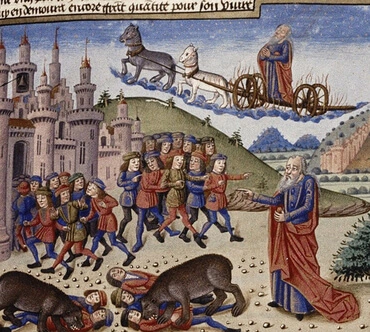1
I lifted up my eyes again, and looked, and behold a man with a measuring line in his hand.
2
Then said I, Whither goest thou? And he said to me, To measure Jerusalem, to see what is its breadth, and what is its length.
3
And behold, the angel that talked with me went forth, and another angel went out to meet him,
4
And said to him, Run, speak to this young man, saying, Jerusalem shall be inhabited as towns without walls for the multitude of men and cattle in it.
5
For I, saith the LORD, will be to her a wall of fire on every side, and will be the glory in the midst of her.
6
Ho, ho, come forth, and flee from the land of the north, saith the LORD: for I have spread you abroad as the four winds of the heaven, saith the LORD.
7
Deliver thyself, O Zion, that dwellest with the daughter of Babylon.
8
For thus saith the LORD of hosts; After the glory hath he sent me to the nations which wasted you: for he that toucheth you, toucheth the apple of his eye.
9
For behold, I will shake my hand upon them, and they shall be a spoil to their servants: and ye shall know that the LORD of hosts hath sent me.
10
Sing, and rejoice, O daughter of Zion: for lo, I come, and I will dwell in the midst of thee, saith the LORD.
11
And many nations shall be joined to the LORD in that day, and shall be my people: and I will dwell in the midst of thee, and thou shalt know that the LORD of hosts hath sent me to thee.
12
And the LORD shall inherit Judah his portion in the holy land, and shall choose Jerusalem again.
13
Be silent, O all flesh, before the LORD: for he is raised up out of his holy habitation.







